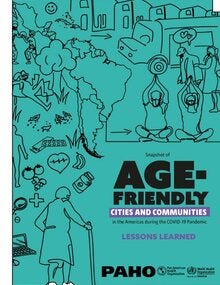Most COVID-19 related deaths in the Region of the Americas have occurred in people aged 70 years and over. The impact of the COVID-19 pandemic has further revealed the fragility of older adults, as well as of the health systems and communities that support them. However, age-friendly environments and related initiatives have played a key role in the timely adaptation to and mitigation of the effects of COVID-19. Various age-friendly cities and communities in Latin America participated in a survey aiming to understand the role of such initiatives in the Region, the impact of being part of the global network, and to present best practices adopted during the COVID-19 pandemic. This publication aims to show that being part of the “age-friendly global network” is beneficial not only to older persons but for all, and it can be especially beneficial in emergency situations. Its intended impact is to increase the quality of planning and concrete actions of age-friendly environments within the Region of the Americas. The primary target audiences of this publication are Member States of the Pan American Health Organization (PAHO) and stakeholders that are involved and have prior knowledge of the practice of age-friendly environments. It also intends to reach age-friendly cities and communities in the Region of the Americas to share good practices that can be reproduced, as well as encourage such initiatives on behalf of older individuals. Its key messages highlight the importance of access to technology for older people and how being an age-friendly city plays an important role in reaching vulnerable populations. It also shows how a multisectoral approach and the involvement of different actors have made a huge impact in the development of activities toward an age-friendly environment and in favor of the protection of older adults.
|

